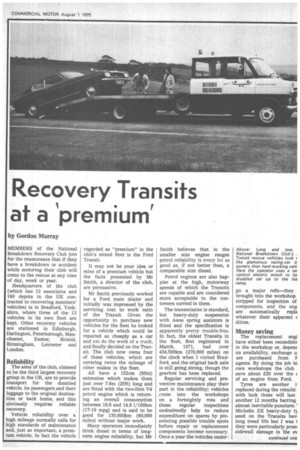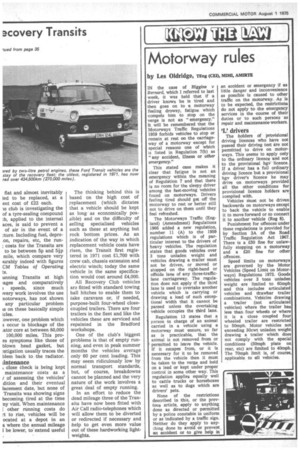Recovery Transits at a 'premium'
Page 37

Page 38

If you've noticed an error in this article please click here to report it so we can fix it.
by Gordon Murray
MEMBERS of the National Breakdown Recovery Club join for the reassurance that if they have a breakdown or accident while motoring their club will come to the rescue at any time of day, week or year.
Headquarters of the club (which has 12 associates and 180 depots in the UK contracted to recovering members' vehicles) is in Bradford, Yorkshire, where three of the 12 vehicles in its own fleet are kept. Other recovery vehicles are stationed in Edinburgh, Darlington, Peterborough, Man chester, Exeter, Bristol, Birmingham, Leicester and London.
Reliability
The aims of the club, claimed to be the third largest recovery group in the UK, are to provide transport for the disabled vehicle, its passengers and their luggage to the original destination or back home, and this obviously requires reliable recovery.
Vehicle reliability over a high mileage normally calls for high standards of maintenance and, just as important, a premium vehicle. In fact the vehicle regarded as "premium" in the club's mixed fleet is the Ford Transit.
It may not be your idea or mine of a premium vehicle but the facts presented by Mr Smith, a director of the club, are persuasive.
Mr Smith previously worked for a Ford main dealer and initially was impressed by the servicing cost to work ratio of the Transit. Given the opportunity to purchase new vehicles for the fleet he looked for a vehicle which could be repaired as cheaply as a car and yet do the work of a truck, and finally decided on the Transit. The club now owns four of these vehicles, which are covering twice the mileage of ether makes in the fleet.
All have a 152ern (60in) extension which makes them just over 7.6m (25ft) long and are fitted with the two-litre V4 petrol engine which is returning an overall consumption between 16.6 and 14.8 1/100km (17-19 mpg) and is said to be good for 130,000km (80,000 miles) without major work.
Many operators immediately think diesel in terms of longterm engine reliability, but Mr Smith believes that in the smaller size engine ranges petrol reliability is every bit as good as, if not better than, a comparable size diesel.
Petrol engines are also happier at the high, motorway speeds of which the Transits are capable and are considered more acceptable to the customers carried in them.
The transmission is standard, but heavy-duty suspension with Aeon spring assistors is fitted and the specification is apparently pretty trouble-free. In fact, the oldest Transits in the fleet, first registered in March, 1971, had over 434,500km (270,000 miles) on the clock when I visited Bradford, and the original back axle is still going strong, though the gearbox has been replaced.
Regular servicing and preventive maintenance play their part in the reliability; vehicles 07cme into the workshops on a fortnightly rota and these regular inspections undoubtedly help to reduce expenditure on spares by pinpointing possible trouble spots before repair or replacement components become necessary. Once a year the vehicles under go a major refit—they brought into the workshop stripped for inspection of components, and the eng are automatically repla whatever their apparent c dition.
Money saving
The replacement engi have either been reconditio in the workshop or, depenc on availability, exchange u are purchased from F agents. By doing the job in own workshops the club save about £20 over the of an engine from Ford.
Tyres are another ii replaced during the rebuild with luck these will last another 12 months barring almost inevitable puncture.' Michelin ZX heavy-duty t) used on the Transits hayi long tread life but I was 1 they were particularly prom sidewall damage in the ev flat and almost inevitably Led to be replaced, at a ent cost of £22 each.
le club is investigating the of a tyre-sealing compound applied to the internal aces, is said to prevent a of air in the event of a Aure. Including fuel, depreon, repairs, etc, the run; costs for the Transits are to be between 5p and 5ip mile, which compare very ourably indeed with figures CM Tables of Operating ts.
unning Transits at high 'ages and comparatively speeds, since much ■ very work involves the use notorways, has not shown any particular problem ts on these basically simple ides.
:owever, one problem which s occur is blockage of the ,ator core at between 80,000 100,000 miles. This proes symptoms like those of blown head gasket, but 3stigation usually traces the blem back to the radiator.
iintenance
close check is being kept maintenance costs as a r of assessing the vehicles' dition and their eventual lacement date, but none of Transits was showing signs becoming tired at the time fly visit. When maintenance 1 other running costs do rt to rise, vehicles will be mated at a depot in an a where the annual mileage be lower, to extend useful The thinking behind this is based on the high cost of replacement (which dictates that a vehicle should be kept as long as economically possible) and on the difficulty of selling specialised vehicles such as these at anything but rock bottom prices. As an indication of the way in which replacement vehicle costs have risen, the Transit first registered in 1971 cost £1,700 with crew cab, chassis extension and electric winch; today the same vehicle in the same specification would cost around £4,000.
All Recovery Club vehicles are fitted with standard towing ball hitches to enable them to take caravans or, if needed, purpose-built four-wheel closecoupled trailers. There are four trailers in the fleet and like the vehicles these are serviced and repainted in the Bradford workshops.
One of the club's biggest problems is that of empty running, and even in peak summer months the vehicles average only 60 per cent loading. This may seem ridiculously low by normal transport standards, but, of course, breakdowns cannot be planned and the very nature of the work involves a great deal of empty running.
In an effort to reduce the dead mileage three of the Transits have now been fitted with Air Call radio-telephones which will allow them to be diverted or redirected if necessary and help to get even more value out of these hardworking lightweights.




















































































